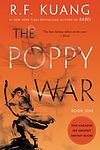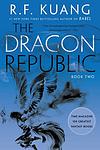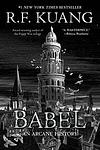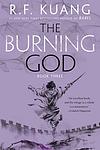R. F. Kuang
R. F. Kuang is a Chinese-American fantasy author, best known for her debut novel 'The Poppy War', which is the first book in a trilogy inspired by historical events in 20th-century China, including the Sino-Japanese War. Her work has received critical acclaim for its complex characters and exploration of themes such as war, power, and mythology.
Books
This list of books are ONLY the books that have been ranked on the lists that are aggregated on this site. This is not a comprehensive list of all books by this author.
-
1. The Poppy War
The book is a fantasy novel set in a world inspired by China's 20th century history. The protagonist, a war orphan, defies societal expectations by acing the empire-wide examination and earning a place at the prestigious military academy. However, her triumph is short-lived as she becomes embroiled in a violent conflict, which forces her to delve into the depths of her own magical abilities, inspired by shamanism. The story intertwines the brutal realities of war, mythology, and the exploration of power in a deeply divided society.
-
2. The Dragon Republic
In this dark and gripping fantasy sequel, the protagonist, a young warrior and shaman, grapples with the aftermath of a brutal war and her own harrowing actions. Betrayed by allies and seeking redemption, she aligns with a new military force with the hope of transforming the corrupt empire into the titular republic. As she navigates political intrigue, battles monstrous forces, and confronts her inner demons, she must also contend with the destructive power of the gods and the weight of her burgeoning abilities. The novel explores themes of power, identity, and the cost of revolution in a richly detailed, war-torn world.
-
3. Babel
This novel is a dark academic fantasy set in an alternate 19th-century Oxford, where translation is the key to harnessing magical power. It follows the journey of an orphan from Canton, who, after a tragic loss, is brought to England and later admitted into the prestigious Royal Institute of Translation, known as Babel. There, he discovers the true cost of the empire's linguistic dominance and magical control. As tensions rise and loyalties are tested, the protagonist must navigate a complex web of colonialism, power, and rebellion, ultimately confronting the oppressive structures of the institute and the empire it serves. The narrative weaves together themes of language, knowledge, and resistance, challenging the foundations of power and the price of progress.
-
4. The Burning God
In this gripping finale to a fantasy trilogy inspired by historical events in 20th-century China, a young shaman and war orphan confronts the devastating cost of her quest for power and revenge. As she returns to her homeland, she finds it ravaged by war and famine, and must reckon with the alliances she has formed and the monstrous deity that grants her strength. With the fate of her people hanging in the balance, she engages in brutal battles against both foreign invaders and the treacherous forces within her own ranks, ultimately facing a final, harrowing choice that will determine the future of her world.



